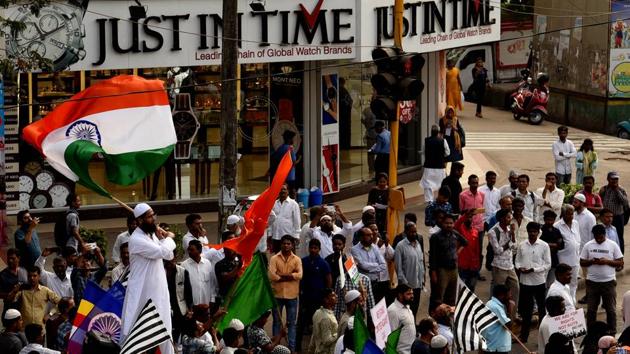Make no mistake, Mumbai is mostly political and non-silent
Silence speaks volumes, silence is political too.
At the height of the 2011 India Against Corruption movement, a frontline member of Anna Hazare’s team surveyed the rather thin crowd at MMRDA Grounds – against a sea of people in other cities – and remarked that Mumbai had become so commercial that it had forgotten to be a political city. It forced Hazare and his core group to abruptly call off their agitation. The last few weeks, including the last three days, would have shown the cynic that Mumbai’s political heart is beating just fine; that its political sense was evolved enough to not lionise Hazare and a crafty agitation.

Within hours of the goondaism and violence unleashed allegedly by the right-wing ABVP at Jawaharlal Nehru University in New Delhi last Sunday night, students and youngsters were motivated to go to the Gateway of India. With songs and slogans, and placards, they demonstrated their disgust and protest. The violence was political. Mumbai’s protest was political too – as political as the demonstrations at August Kranti Maidan, Dharavi, and other places since December.
This ‘Occupy Gateway’ movement lived out two nights, cold nights by Mumbai’s tepid winter, and seemed set to make a huge statement with dogged youngsters, known personalities, inspired songs, and creative placards, till the “Free Kashmir” board triggered the Uddhav Thackeray government which hurriedly wrapped it up. The largely spontaneous movement showed that Mumbai’s young are not apolitical; the lack of overt political processes in colleges had not led to a disinterested generation. From the city’s colleges to IIT-Bombay and TISS, students took to the streets. The Team Anna member must wonder if it’s the same Mumbai after all. More than 140 of the IIT-B faculty signed a protest statement. That’s a bold political statement.
Mumbai’s writers, artists, publishers, and others protested at Azad Maidan — away from the public glare as the once-vibrant protest venue now is — against the violence as well as the Citizenship (Amendment) Act and National Register of Citizens. The city’s working class protested on Wednesday. Social media groups of various sorts are buzzing with posts, poetry, and art. Across generations and sections of protestors, they have shown an acute sense of urgency and purpose.
Of the two other sections of society that make the city, the film fraternity stood up this time. From occupying the Carter Road promenade to singing songs of revolution and love, some of the most noteworthy names in Bollywood were there. It was difficult to not keep the beat to Swanand Kirkire rendering “Bavara mann…” which was an anthem of hope and resistance that night; or resist asking Vishal Bharadwaj to repeat his verse. Zoya Akhtar, Anurag Kashyap, Anubhav Sinha, Sushant Singh – the glamour list is long and growing. Bollywood found its voice – and how.
Then, there was Deepika Padukone at JNU on Tuesday evening; her gesture making the boldest political statement a superstar has in recent times. Those who dismiss it as a pre-release publicity stunt for her movie do not realise that she now faces the full might of an infuriated government and the viciousness of the BJP’s troll army. Before her were the feisty Swara Bhasker and RichaChhada, battling the bile and hate of right-wing groups and troll armies daily.
So what if the superstar men of Bollywood have not found their voice? Their silence is a political statement too. Bollywood is now a fraternity divided, but there’s nothing to regret about it.
The city’s business fraternity or India Inc does not come out smelling of bespoke musk. Some tried sounding woke in their social media posts but even the best of them were hand-wringing about not making the JNU-related protests political. Come again, gentlemen? The violence was political, the issue is political. How then can responses be apolitical? Students and other youngsters, it seems, have a sharper sense of politics than some business leaders, Rahul Bajaj notwithstanding.
A day after students and teachers were attacked with iron rods inside the JNU campus, these business leaders were with Prime Minister Narendra Modi for a scheduled meeting. The CAA-NRC-JNU violence must have hung heavy in the air in that room but there must have been studied silences about it all. Modi, hailed by many as a great orator, has been silent too.
Silence speaks volumes, silence is political too.

Stay updated with all the Breaking News and Latest News from Mumbai. Click here for comprehensive coverage of top Cities including Bengaluru, Delhi, Hyderabad, and more across India along with Stay informed on the latest happenings in World News.
Stay updated with all the Breaking News and Latest News from Mumbai. Click here for comprehensive coverage of top Cities including Bengaluru, Delhi, Hyderabad, and more across India along with Stay informed on the latest happenings in World News.





